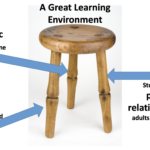You may think of the first weeks of school as a time to focus on classroom management, and it is. But in fact, all year long, we should consider classroom management an active part of our daily teaching. How do
A great learning environment is like a three-legged stool. Ruth Charney first introduced this concept to me years ago. It’s an important idea to keep in mind all year long, but it’s crucial during the first weeks of school.
The
Walk through most schools, and you’ll see messages like the ones above, posted in classrooms and in hallways. We often encourage kids, as they’re about to work to “try your best” or “put in max effort.” One year in
A few years ago my wife gave me three months of coaching for my birthday. I’d been running 5K road races and was trying some half-marathons. She thought I could use some professional help! We connected online, and I sent
This is probably a bit of a misleading title since there are plenty of overlaps between teaching SEL and character ed. If we put these two terms into a Venn diagram, we’d find plenty of overlaps. In my mind, there’s
What did the mathematical acorn say when he grew up?
“Ge-om-e-try!” (“Gee, I’m a tree!”)
Ah—dad jokes. Silly plays on words. Puns. Cornball humor. Eye-rollers. Groaners.
Ted Lasso is packed with goofy humor. Have you noticed how this keeps your
My wife and I loved watching Ted Lasso. In fact, when our daughter came home from college for the holidays, we got her into it and watched both seasons again! One of the most powerful and uplifting scenes comes in
Even if you haven’t binge-watched Ted Lasso like I have (twice!), you’ve probably heard of it. In this blog post, we’ll explore one of Ted Lasso’s classic lines: Be a Goldfish and consider how it might help us when we’ve
A Brief History of Behaviorism, Part 5
If you could travel back in time about 60 years and walk through a typical school, you might be surprised to find something missing. You wouldn’t see behavior charts or “star student” award
A Brief History of Behaviorism, Part 4
If you could travel back in time about 60 years and walk through a typical school, you might be surprised to find something missing. You wouldn’t see behavior charts or “star student” award
A Brief History of Behaviorism, Part 3
If you could travel back in time about 60 years and walk through a typical school, you might be surprised to find something missing. You wouldn’t see behavior charts or “star student” award
A Brief History of Behaviorism, Part 2
If you could travel back in time about 60 years and walk through a typical school, you might be surprised to find something missing. You wouldn’t see behavior charts or “star student” award
A Brief History of Behaviorism, Part 1
If you could travel back in time about 60 years and walk through a typical school, you might be surprised to find something missing. You wouldn’t see behavior charts or “star student” award
Do your students seem young this year? You’re not alone. In every single school I’m working in this year—with no exceptions—teachers are saying the same kinds of things.
This shouldn’t be surprising. Students always seem a bit young in the
It is now widely recognized that social-emotional learning (SEL) should be an integral part of teaching and learning in schools. Yet it sometimes feels so overwhelming. SEL is just so…BIG. How do you know where to start?
Some districts purchase
“To weave the magic of a thing, you see, one must find its true name. In my lands we keep our true names hidden all our lives long, from all but those we trust utterly; for there is great power,
The last weeks of school are a tumultuous time of transition. Not all students look forward to summer vacation, and even ones who do are likely anxious about next year. For some students, next year brings a new school, not
As schools welcome more and more students back through their doors, we’re all trying to figure out the best way to do so. It seems as though there are two wildly different needs we must address. As I talk with
As educators, we all want our students to be motivated. Teachers and schools often pour immense amounts of energy into trying to motivate students, yet often it seems like the more we try, the less kids care. What’s going on?
Teacher language can be a great focus for a New Year’s resolution. After all, we all use language with students, and we all surely have some habits that could use some refinement. Often, some of our language habits don’t line
What if there was a learning strategy that boosted student engagement, had many (many!) academic benefits for students, and reduced teacher planning and correcting/grading time? Great news! There is–and it’s a tried and true strategy you have probably been using
After the abrupt ending to school last year, the hope and goal was to begin the 2020 – 2021 school year ready to thrive in whatever format teaching would occur. Many teachers were feeling more comfortable with remote teaching and
Last week I had the privilege of teaching two online workshops for teachers about getting ready for the upcoming school year. They were both so much fun! We played games that teachers can use with their students (either in person
“I’m on the edge of a breakdown. I’m pouring everything I have into my students, and it doesn’t seem to be enough. My principal keeps telling me I need to take care of myself, but she never gives me time
It might be the understatement of the summer that teachers, students, parents, and administrators are anxious about the upcoming school year.
In addition to the priorities of health, safety, and equity of access to education in this COVID-19 period, distance












